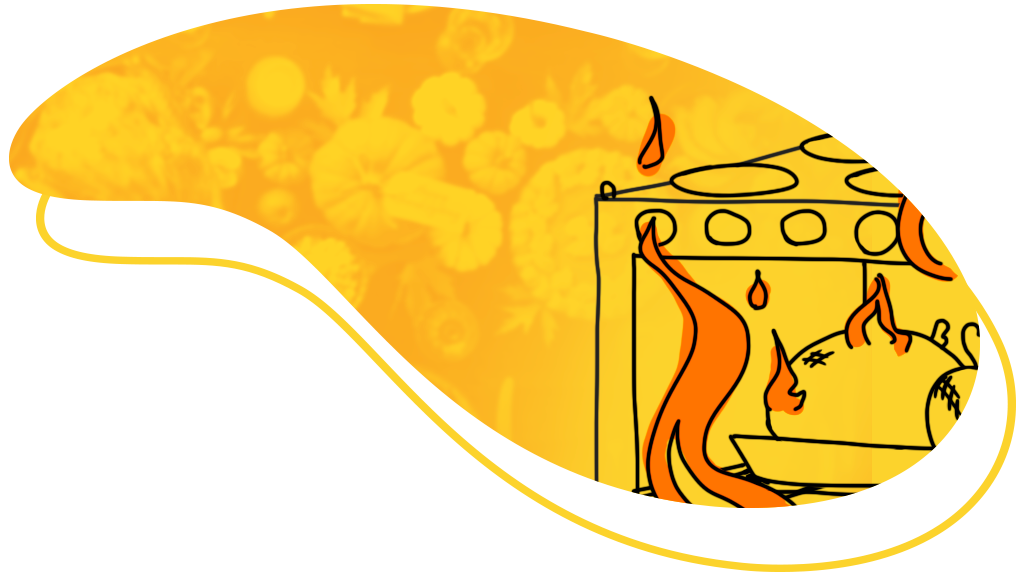Thanksgiving is one of the most important holidays in the USA. However, it’s not all pumpkins and cranberries. Thanksgiving is also the day with the most fires in domestic kitchens according to the National Fire Protection Association’s (NFPA) 2020 Home Cooking Fires report.
Second place was Christmas, with less than half of the occurrences, followed by none other than the day before Thanksgiving. In other words, two days on the list were related to the same holiday. The guests, the NFL games on TV and the variety of dishes, coupled with the inherent tiredness at the end of the year, are perfect distractions that can lead to a scary situation.
It can happen to anyone. Therefore, we need to be prepared, informed and ready to work around any situation.
Facts about the Thanksgiving fire
- In 2018, US fire departments responded to about 1,630 house fires on Thanksgiving Day, the peak day of these fires.
- Leaving the oven/stove unattended is a major contributing factor to kitchen fires and fire deaths.
- Cooking was the top cause of all of 74% of the 2018 Thanksgiving fires.
- Cooking caused nearly half of all home fires and injuries in the home, and is the second leading cause of deaths from home fires in 2014-2018.
- The average fire insurance claims for home kitchens were $6,900 from 2014 to 2018.
Source: NFPA
Does my insurance cover these kinds of fires?
Your Homeowners Insurance, as simple as it is, covers damage caused by fire in your home. Residential coverage also extends to your garage, sheds, and any other outbuildings on your property, so if you set fire to another area outside the kitchen, it’s covered.
But for each specific injury, you may need specific coverage. Your liability coverage will help pay medical bills if the fire injures a guest. If your home becomes uninhabitable, loss of use coverage comes to your rescue to help with hotel and restaurant bills while you wait for repairs. Your personal property coverage may pay to replace clothes, appliances, cookware or whatever else you lose to the flames.
But remember, not all of these coverages are part of the standard policy. You’ll have to review your policy to make sure you’re protected in every way you want.
Also, it is important to clarify that your home insurance will not pay for damages caused by a fire intentionally started by you or a member of your family, but it may cover you if you are the victim of an arson fire.
Deep Fried Turkey
In recent years, the traditional turkey recipe has come out of the oven to appear in our own or in improvised fryers. This dangerous modality has been responsible for the highest mortality rate for every 1,000 fires in home kitchens, according to the NFPA. It is also responsible for the second-highest average of fire losses in home kitchens and the fourth-highest rate of injuries from home kitchen fires.
Frying fires cause five deaths, 60 injuries, destroy 900 homes and cause more than $15 million in property damage every year.
While experts strongly recommend that you don’t deep fry your turkey, we know that certain cooks are hard-headed and you may end up with a deep fried turkey at your family gathering (or your own!).
Before doing this, which is dangerous enough, make sure you take all the necessary precautions beforehand and are ready for any future occurrences.
Fryer Safety
- Always use an outdoor turkey fryer on a flat surface. Make sure you are away from structures, wooden decks and covered patios. Never use a fryer in a garage.
- Have a fire extinguisher nearby and ready to use.
- Never leave the fryer unattended. Monitor the oil temperature with a thermometer to prevent the oil from overheating and catching fire.
- Make sure the turkey is completely defrosted to prevent a fire.
- Always keep children and pets away from the fryer to prevent them from bumping into anything or being nearby in the event of an accident.
But for those of you who really enjoy a deep fried turkey- NFPA recommends buying from places like supermarkets and restaurants that have more experience and the right measures in place so that you can have your turkey and eat it too without a house visit from firefighters.
Tips to avoid a Thanksgiving Disaster
In addition to keeping the fryer in storage, there are other details to be aware of to avoid domestic disasters during Thanksgiving.
Here are some tips for avoiding kitchen problems on Thanksgiving or any other food-intensive party:
- Beware of flammable materials such as food packaging, towels and oven mitts, keep them away from the flame and heat of the oven.
- Avoid wearing long sleeves, hanging fabrics, bows, scarves, or any accessory that could come into contact with a heat source and catch fire without your noticing.
- Do not leave anything cooking on the stove unattended. Even if you do this in your day to day, on holidays the distractions are greater, so if you leave the kitchen, call for back up.
- Even if turkey takes a long time in the oven, stay indoors while it’s roasting and check it often.
- Make sure you are able to stay alert while cooking. Cooking while intoxicated or even sleepy is very dangerous. Look for a replacement or ask for a delivery, if you find it…
- Keep children away from the kitchen or other areas where hot food or drinks are being prepared or served.
- Keep knives out of children’s reach.
- Make sure that the electrical cords of an electric knife, coffee maker, electric kettle, food mixer or any other appliances are not hanging off the counter within reach of a child or causing a tripping hazard.
- Keep matches and lighters out of the reach of children.
- Never leave children unattended in a room with a candle or a burning fireplace.
- Keep the floor clean so you don’t trip over children, toys, wallets or purses.
- Use the cell phone timer so you don;t forget about meal times.
- Test your smoke detectors often and in advance. Test them by pressing the test button.
- Never throw water or a fire extinguisher onto a fire that is in a pot on top of your stove. Instead, turn off the mouth and cover the fire with a lid or larger pot to smother it. Do not remove the cover as the fire may start again. Allow the pan to cool for a long time.
- If a fire breaks out in your oven, turn off the heat and keep the door closed. Only open the door when you are sure the fire is completely out. If you have questions or concerns, contact the fire department for assistance.
- If you’re not sure you can safely control a fire, leave your home and call 911.
Another suggestion is to think of activities that keep children out of the kitchen during this work period. Select someone or take turns for adults to come up with games, movie sessions, books, or art activities to keep them busy. If you want the children involved, ask them to decorate the table or prepare recipes that can be made outside the kitchen.
Thanksgiving x Covid-19
This will be our first Thanksgiving after the lockdown and despite the reduction in cases and advanced vaccinations, the pandemic is not over yet. Therefore, it is important to take into account the guidelines of the CDC:
- Protect those who are not yet eligible for vaccination, such as young children, by vaccinating yourself and other eligible people around you.
- Wear tightly fitting masks over your nose and mouth if you are indoors in public and not fully vaccinated.
- Even those who are fully vaccinated must wear a mask in closed public settings in communities with substantial to high transmission.
- Outdoors is safer than indoors.
- Avoid crowded and poorly ventilated spaces.
- Maintain constant hand hygiene.
- If you are ill or have symptoms, do not host or attend a meeting.
- Get tested if you have symptoms of COVID-19 or if you have close contact with someone who has tested positive for COVID-19.
- If you’re planning on traveling for a holiday or event, visit the CDC Travel page to help you decide what’s best for you and your family. The CDC even recommends postponing the trip if you are not yet fully vaccinated.
Special Considerations
- People who have an illness or are taking medications that weaken their immune system may not be fully protected, even if they are fully vaccinated and have received an additional dose. They should continue to take all precautions recommended for unvaccinated people, including wearing a well-fitting mask, until their doctor advises otherwise.
- You can choose to wear a mask, regardless of transmission level, if a member of your family has a weakened immune system, is at increased risk of serious illness, or is not vaccinated.
- If you are meeting with a group of people from multiple families and potentially from different parts of the country, you may want to consider additional precautions (i.e. avoiding crowded indoor spaces, testing before travel) before the meeting to further reduce the risk.
- DO NOT mask children under 2 years of age.
Happy Thanksgiving, everyone!
Thanksgiving is a time of good food, good company, and good fun. After the anxieties of 2020, we will finally have the presence of our friends and can continue this way in the next festivities to come. Remember that the precautions with the pandemic are still necessary, as is fire safety.
Do your research, be prepared, make sure you have adequate homeowners insurance, and stay safe.







